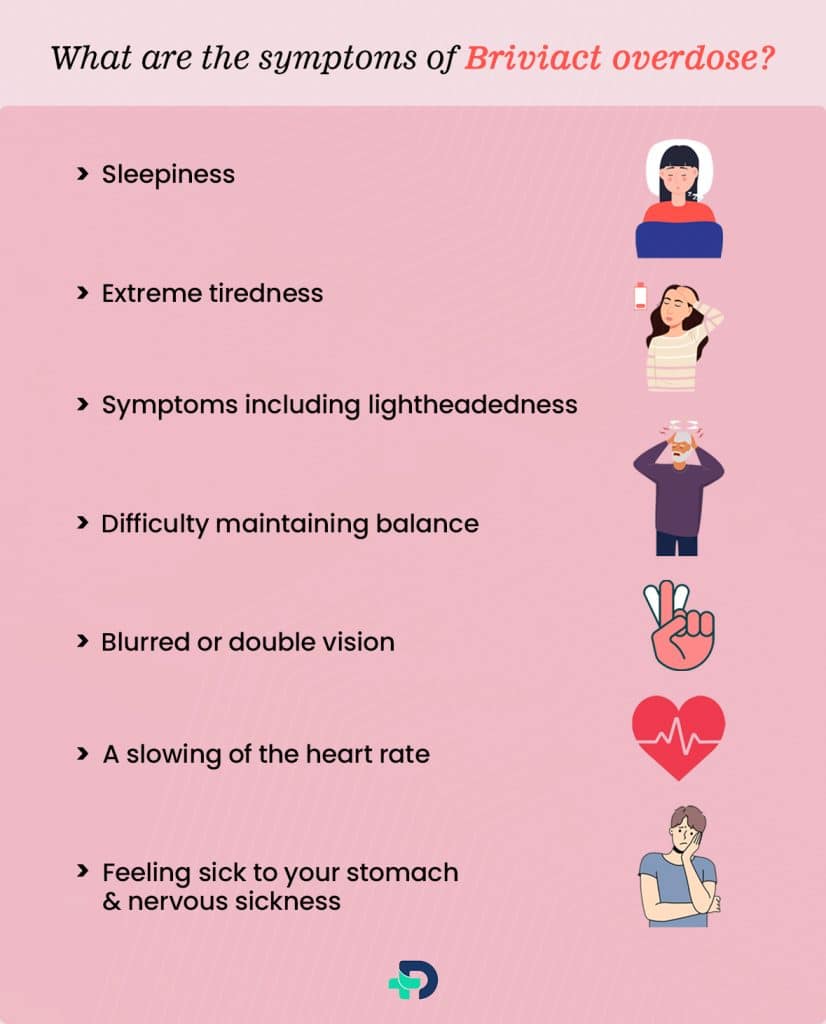Briviact : Uses, Side effects, and Interactions

- Briviact
- 17 Aug 2023
Overview
About Briviact
In February 2016, the Food and Drug Administration (FDA) approved the anticonvulsant and racetam derivative brivaracetam, or Briviact, as an add-on therapy for patients who needed additional treatment. It is suggested as adjuvant therapy for the treatment of partial-onset seizures (POS) in patients who are 16 years of age or older, including both adults and adolescents2Overview| Researched based study from Nlm.nih.gov
More than 65 million people all around the world are affected with epilepsy, making it the fourth most frequent neurological illness overall. The existence of epileptic seizures, which are brought on by an aberrant consecutive firing of excitatory neurons in the brain, is diagnostic of this illness.
A wave of depolarization, called paroxysmal depolarizing shift, can occur in a neuron when many neurons fire at the same time. During this time, the neurons have a reduced resistance to firing, which results in numerous action potentials and abnormally high electrical activity within the brain.

Uses
For what conditions is the Briviact typically prescribed?
Focal seizures
- Briviact® (brivaracetam) was granted approval by the FDA to treat focal seizures in patients aged 16 and older who had not responded adequately to treatment with existing antiepileptic medicines4Uses| Researched based study from Poison.org (AEDs).
Generalized seizures
- It is currently routinely used as a form of add-on treatment in conjunction with other AEDs in order to treat generalized seizures.4Uses| Researched based study from Poison.org
Side effects
Which potential side effects might be associated with the usage of Briviact?
Mild side effects
There is a possibility of experiencing adverse effects when taking brivaracetam. Talk to your primary care provider if any of the following symptoms become very bothersome or if they fail to improve:1Side effects| Researched based study from Medlineplus.gov
- Constipation
- Nausea and vomiting
- A severe lack of energy or excessive exhaustion
Severe side effects
Some of the adverse effects could even be life-threatening. If you develop any of the following symptoms, as well as those described in the section labeled “SPECIAL PRECAUTIONS,” you must immediately discontinue use of brivaracetam and contact your physician or seek treatment at an emergency medical facility:
- Facial edema that might involve the neck, tongue, lips, and eyes
- Hoarseness, in addition to problems with swallowing and breathing
- Hallucinations or imagining things that are not real or hearing sounds that are not real.
- Delusions or having unusual ideas or beliefs that have no root in reality. Some examples of delusions include having the false belief that other people are attempting to hurt you when in fact this is not the case.
There is a possibility that brivaracetam will induce other adverse effects. If you have any odd side effects while taking this medicine, please consult your primary care physician as soon as possible.
Overdose

What are the symptoms of Briviact overdose?
Some of the following may be experienced by someone who has taken too much Briviact:
- Sleepiness
- Extreme tiredness
- Symptoms including lightheadedness
- Difficulty maintaining balance
- Blurred or double vision
- A slowing of the heart rate
- Feeling sick to your stomach and nervous sickness 1Overdose| Researched based study from Medlineplus.gov
Interactions
Drug-drug interactions with Briviact
Rifampin
- Co-administration of rifampin with BRIVIACT results in a decrease in plasma concentrations of BRIVIACT, most likely as a result of the induction of CYP2C19.
- Patients who are undergoing concurrent therapy with rifampin should have their prescribers raise their BRIVIACT dosage by up to 100 percent (i.e., double their current dosage) 3Interactions| Researched based study from Dailymed.Nlm.nih.gov
Carbamazepine
- Co-administration of carbamazepine may enhance exposure to its active metabolite, carbamazepine-epoxide.
- Carbamazepine-epoxide is responsible for carbamazepine’s anticonvulsant effects 3Interactions| Researched based study from Dailymed.Nlm.nih.gov
- Although the data that were available did not disclose any safety concerns, it is recommended that a carbamazepine dose decrease be investigated in the event that tolerability issues develop when the two medications are used together.
Phenytoin
- BRIVIACT can raise plasma levels of phenytoin.
- Phenytoin levels should be observed in patients whenever concomitant BRIVIACT is introduced to or withdrawn from ongoing phenytoin medication 3Interactions| Researched based study from Dailymed.Nlm.nih.gov
Levetiracetam
- When levetiracetam and BRIVIACT were given at the same time, the former did not confer any further therapeutic advantage on the latter.
Dosage
Dosage and administration of Briviact
- Brivaracetam should be used at a beginning dose of 50 milligrams (mg) twice daily, for a total daily dose of 100 milligrams (mg)2Dosage| Researched based study from Nlm.nih.gov
- When first beginning treatment, it is not required to gradually increase the amount being administered.
- Depending on how well the patient tolerates the medication and how well the treatment is working for them, the dosage may be changed down to 50 mg daily or up to 200 mg daily.
- Oral tablets of 10, 25, 50, 75, and 100 milligrams of brivaracetam, oral solutions of 10 milligrams per milliliter, and intravenous (IV) injections of 50 milligrams per milliliter are all available forms of this medication2Dosage| Researched based study from Nlm.nih.gov
In the event that it is not possible to provide brivaracetam orally, the injectable form of the medication can be given in the same quantity and at the same intervals as the tablets and the oral solution. On the other hand, it is essential to keep in mind that the expertise gained from the clinical trial using brivaracetam injection is restricted to a therapy that lasts for only four days in a row.
Precautions
Which supplementary safety measures am I expected to take for Briviact?
- Before you start taking brivaracetam, you should tell your medical examiner and pharmacist if you are allergic to it, any other drugs, or any of the ingredients in Briviact pills or liquid. To find out what’s in the medicine, you can either ask your doctor or look it up online1Precautions| Researched based study from Medlineplus.gov
- Tell both your doctor and your pharmacist about all the prescription and over-the-counter drugs, vitamins, nutritional supplements, and plant products you are taking or plan to take in the future.
- Make sure to tell your doctor if you are taking carbamazepine, levetiracetam, phenytoin, or rifampin. Your doctor may need to change the amounts of your medications or keep a close eye on you to make sure you don’t have any bad side effects1Precautions| Researched based study from Medlineplus.gov
- Talk to your primary care provider if you are drinking a lot of alcohol or if you have done so in the past. You should also do this if you have ever used illegal drugs or if you have ever taken more than the suggested amount of a prescribed drug.
- Tell your doctor if you have or have ever experienced depression, mental problems, suicidal thoughts or actions, kidney disease that was cured using dialysis (a process to clean the blood externally to the body when the kidneys aren’t functioning properly), or liver disease.
- If you are breastfeeding, are pregnant, or are hoping to conceive soon, you should tell your doctor. If you conceive a baby while taking brivaracetam, you should talk to your medical examiner right away.
- You should know that brivaracetam can make you feel sleepy or dizzy, and it can also blur your vision or make it hard for you to move in sync with your body and keep your balance. Do not drive a car, run tools, or do anything else that requires focus or coordination until you know how this drug makes you feel1Precautions| Researched based study from Medlineplus.gov
- If you are taking brivaracetam, talk to your doctor about how safe it is to drink alcohol while taking this medicine. Brivaracetam could make the bad things that drinking does to the body even worse.
- During the time you take brivaracetam, you should know that your mental health could change in ways you didn’t expect, and you could develop suicidal ideation, which is the tendency to fantasize about hurting or killing yourself, as well as the planning or carrying out of such fantasies.
- You and your doctor will decide if the risks of taking an anticonvulsant drug are higher than the risks of not taking the drug1Precautions| Researched based study from Medlineplus.gov
If you are unable to seek treatment for yourself, it is important to make sure that your family or the person who is caring for you is aware of the symptoms that could indicate a more serious condition so that they can contact a medical professional.
Takeaway
Takeaway
Epilepsy affects more than 65 million people around the world and has been diagnosed in around 1 in 100 people living in the United States. It is characterized by seizures that occur repeatedly, and it is commonly identified in those who have experienced two or more seizures.
While you are on Briviact, you should be aware that you may experience suicidal thoughts. At each of your follow-up appointments, your primary care physician should evaluate your progress. Alterations in your state of mind or symptoms should also be brought to the attention of your family or other caretakers.
Any feedback on this article?
 This Articles content was accurate
This Articles content was accurate Very Informative Article
Very Informative Article I have a question or a comment
I have a question or a comment
 This article contains inaccurate content
This article contains inaccurate content This article was not helpful
This article was not helpful I have a question or a comment
I have a question or a comment
We appreciate your helpful feedback!
Checkout our social pages
References
-
Medline Plus
Brivaracetam | Precautions | Side effects | Overdose
-
National Library of Medicine
Brivaracetam (Briviact) | Overview | Dosage
-
Dailymed
BRIVIACT- brivaracetam tablet, film coated, Suspension, Solution | Interactions
-
Poison Control
Briviact® (brivaracetam) for Epilepsy | Uses




































